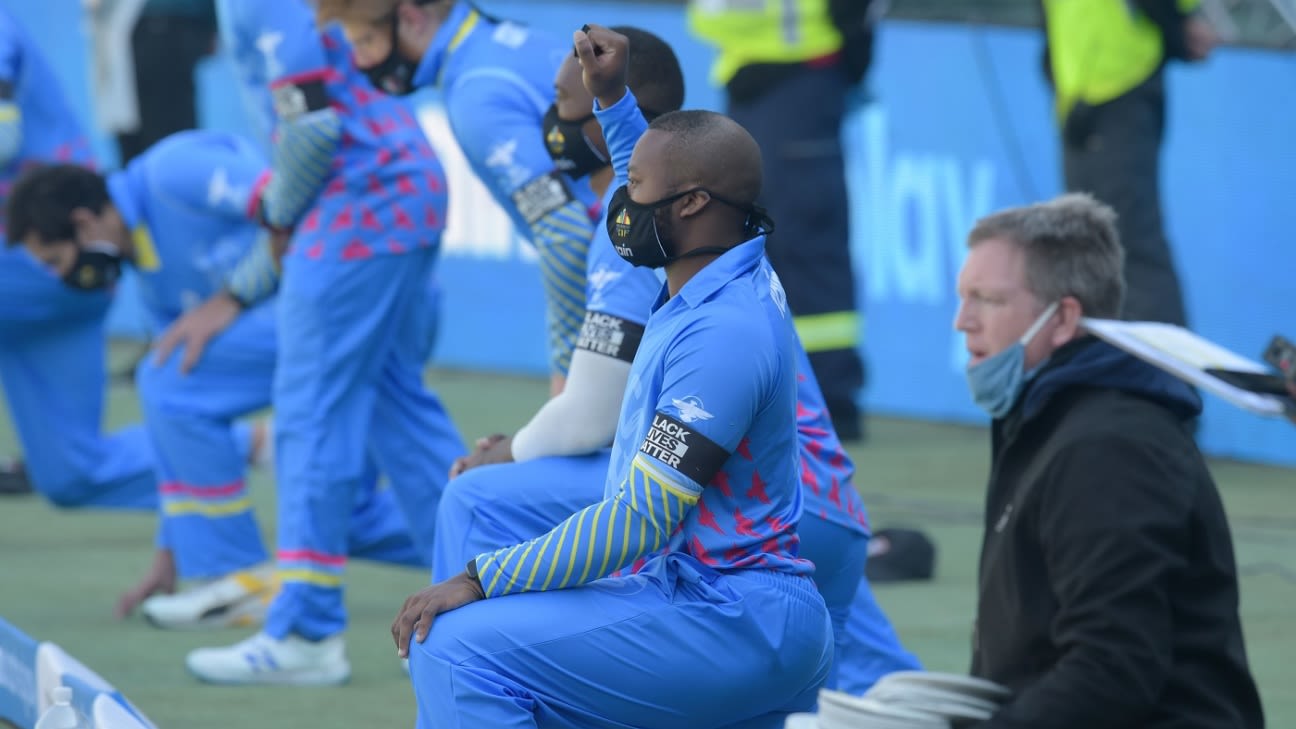CSA has made public its plans to tackle alleged racism in cricket in the country, its Transformation Committee announcing a sustainable response strategy project called Cricket for Social Justice and Nation Building (SJN).
“The national outcry by cricket fans, the greater South African public and broad stakeholder groups could not be ignored,” CSA said in a statement while talking about the project.
The Black Lives Matter (BLM) movement became a part of cricket after Daren Sammy spoke of a “degrading” nickname he had been given in the Sunrisers Hyderabad dressing room, and then moved up a notch when Lungi Ngidi, in response to a question in a press interaction, called for the cricket community in South Africa to “make a stand“. Soon after this, 36 prominent South African players and coaches of colour expressed their support for Ngidi, followed by the likes of Hashim Amla and Faf du Plessis speaking out. It all culminated in South Africa’s elite cricketers – as well as support staffers, CSA officials, and members of the commentary team – taking a knee at Centurion’s SuperSport Park ahead of the 3TC match last Saturday.
ALSO READ: Bal – It’s time we South Asians understood that colourism is racism
CSA will set up a Transformation Ombudsman responsible for managing complaints while also ensuring that players and fans unite. CSA aims to appoint the ombudsman by August, with Dr Eugenia Kula-Ameyaw, the independent director and transformation chair, tasked with ensuring that the process flows smoothly.
“Transformation needs to happen in our lifetime and as the Board we need to fully deliver on that mandate. Having heard what our ex-players shared, my focus as the Transformation Chair was to come up with a solution, hence the Cricket SJN concept,” Kula-Ameyaw said. “I am grateful that the Board supports this initiative. The office of the Transformation Ombudsman is a solid brick that we can use as a foundation to deal with racism and discrimination in cricket.”
“We are sorry that our cricket players had to endure the emotional hardships that they did; subjugated by their peers along racial lines under our new democracy that enjoined us to embrace reconciliation and inclusivity,” CSA Board chair Chris Nenzani said. “SJN is the first-of-its-kind project meant to rid cricket of apartheid racial discrimination. This is the very important project that all stakeholders must make sure it succeeds for the future sustainability of cricket.
“We commit that never again shall we be found wanting and will consolidate our efforts to assure an inclusive cricket environment, free of any discrimination, racism or any other ill that negate the gains of the democracy that we fought so hard for”
Dr Jacques Faul
“The fortunes of cricket, its players, stakeholders, and fans are not going to be held to ransom by the wayward few who definitely have no place within our ranks,” he added. “We are determined to pull out all stops to ensure that healing takes place for those who have been wronged, and that perpetrators are exposed, sanctioned, and isolated.”
The SJN also aims to form a Restoration Fund in order to deal with the opportunity cost due to discrimination as well as “promote and intensify” the diversity, belonging and inclusivity programme implementation.
Dr Jacques Faul, the CSA’s acting chief executive, said, “It has been a very challenging time for Cricket South Africa, and we have to acknowledge that what we have heard was not easy to digest. However, I am also encouraged by our plan to address this. We will need the buy-in from all our stakeholders to ensure a racism free future at Cricket South Africa.
“We commit that never again shall we be found wanting and will consolidate our efforts to assure an inclusive cricket environment, free of any discrimination, racism or any other ill that negate the gains of the democracy that we fought so hard for.”
